Criminology 3 Essay: Minimum Age of Criminal Responsibility in Canada
VerifiedAdded on 2022/10/01
|7
|1648
|19
Essay
AI Summary
This essay delves into the critical issue of the minimum age of criminal responsibility within the Canadian legal system. It explores the multifaceted nature of youth crime, acknowledging factors like poverty, prejudice, and environmental influences. The essay defines criminal responsibility, highlighting defenses such as infancy and the legal framework established by the Youth Criminal Justice Act. Arguments supporting the current minimum age of 12 years are presented, emphasizing the importance of accountability and the prevention of crime. Conversely, the essay examines arguments against this age, referencing UN guidelines and the developmental immaturity of children, suggesting that the minimum age should be raised to a level where youths can fully understand the consequences of their actions. The essay draws upon statistical data regarding youth in custody and community service, concluding that raising awareness and the minimum age of criminal responsibility are crucial for preventing youth crime. The essay also includes a comprehensive list of references.
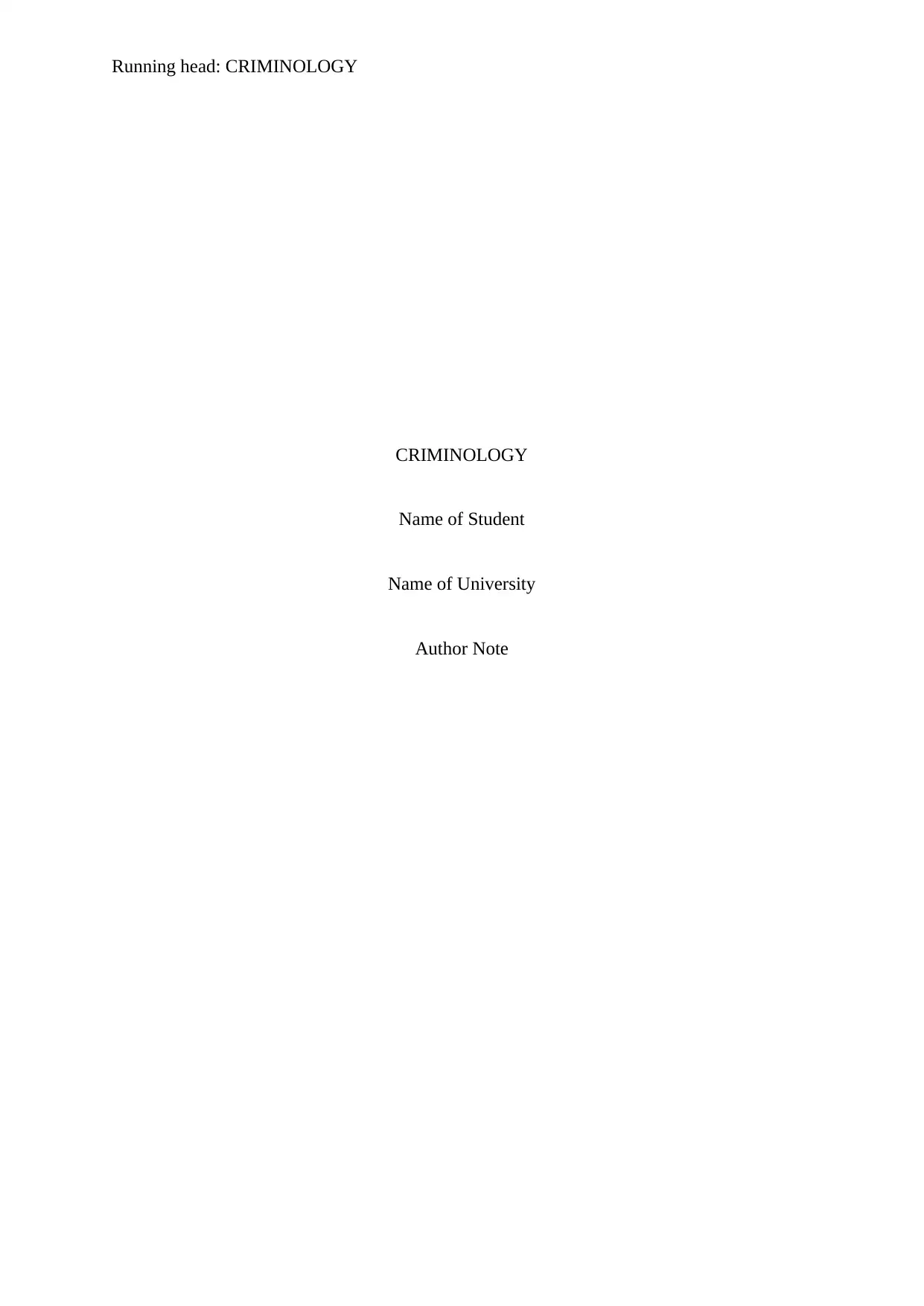
Running head: CRIMINOLOGY
CRIMINOLOGY
Name of Student
Name of University
Author Note
CRIMINOLOGY
Name of Student
Name of University
Author Note
Paraphrase This Document
Need a fresh take? Get an instant paraphrase of this document with our AI Paraphraser
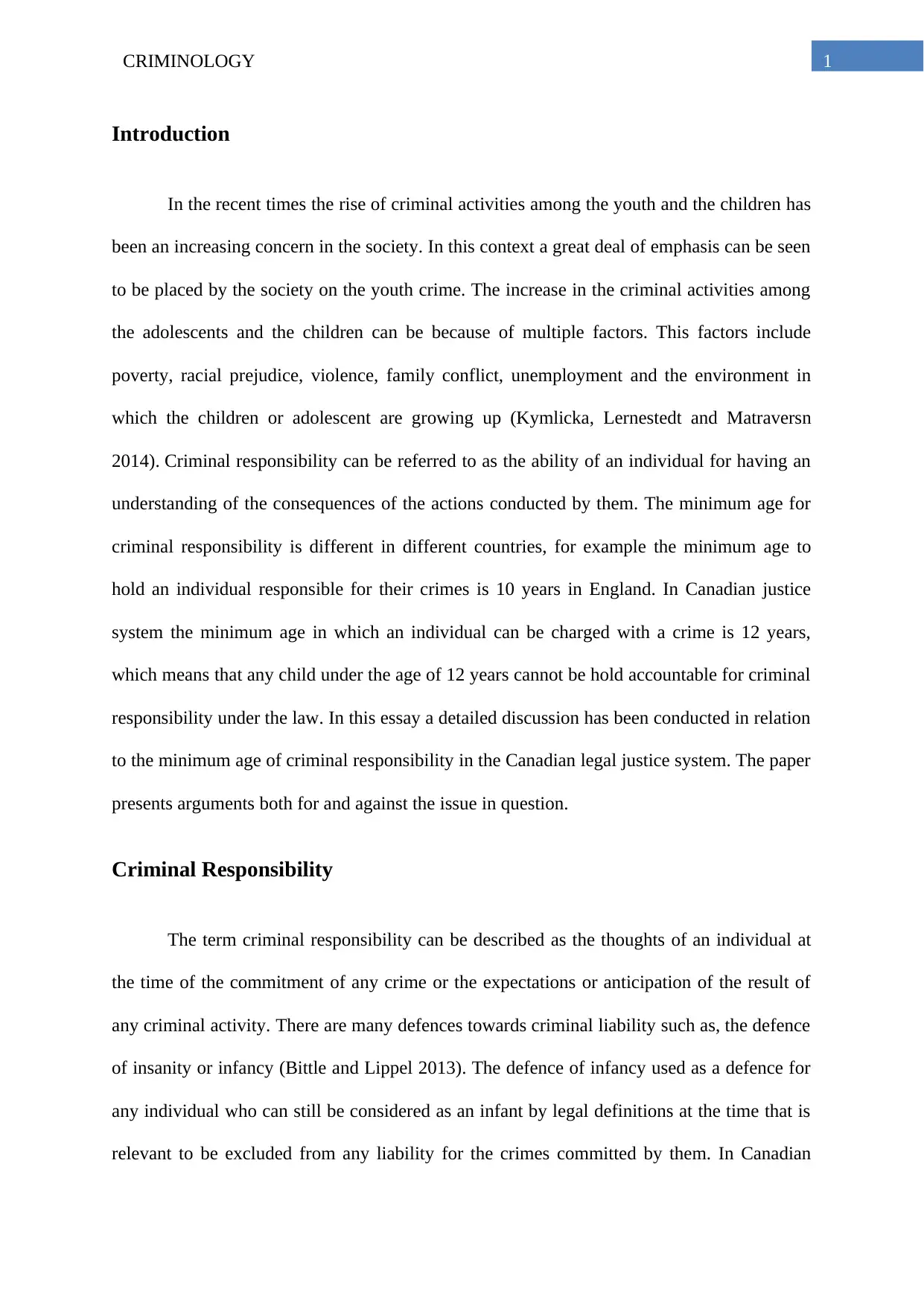
1CRIMINOLOGY
Introduction
In the recent times the rise of criminal activities among the youth and the children has
been an increasing concern in the society. In this context a great deal of emphasis can be seen
to be placed by the society on the youth crime. The increase in the criminal activities among
the adolescents and the children can be because of multiple factors. This factors include
poverty, racial prejudice, violence, family conflict, unemployment and the environment in
which the children or adolescent are growing up (Kymlicka, Lernestedt and Matraversn
2014). Criminal responsibility can be referred to as the ability of an individual for having an
understanding of the consequences of the actions conducted by them. The minimum age for
criminal responsibility is different in different countries, for example the minimum age to
hold an individual responsible for their crimes is 10 years in England. In Canadian justice
system the minimum age in which an individual can be charged with a crime is 12 years,
which means that any child under the age of 12 years cannot be hold accountable for criminal
responsibility under the law. In this essay a detailed discussion has been conducted in relation
to the minimum age of criminal responsibility in the Canadian legal justice system. The paper
presents arguments both for and against the issue in question.
Criminal Responsibility
The term criminal responsibility can be described as the thoughts of an individual at
the time of the commitment of any crime or the expectations or anticipation of the result of
any criminal activity. There are many defences towards criminal liability such as, the defence
of insanity or infancy (Bittle and Lippel 2013). The defence of infancy used as a defence for
any individual who can still be considered as an infant by legal definitions at the time that is
relevant to be excluded from any liability for the crimes committed by them. In Canadian
Introduction
In the recent times the rise of criminal activities among the youth and the children has
been an increasing concern in the society. In this context a great deal of emphasis can be seen
to be placed by the society on the youth crime. The increase in the criminal activities among
the adolescents and the children can be because of multiple factors. This factors include
poverty, racial prejudice, violence, family conflict, unemployment and the environment in
which the children or adolescent are growing up (Kymlicka, Lernestedt and Matraversn
2014). Criminal responsibility can be referred to as the ability of an individual for having an
understanding of the consequences of the actions conducted by them. The minimum age for
criminal responsibility is different in different countries, for example the minimum age to
hold an individual responsible for their crimes is 10 years in England. In Canadian justice
system the minimum age in which an individual can be charged with a crime is 12 years,
which means that any child under the age of 12 years cannot be hold accountable for criminal
responsibility under the law. In this essay a detailed discussion has been conducted in relation
to the minimum age of criminal responsibility in the Canadian legal justice system. The paper
presents arguments both for and against the issue in question.
Criminal Responsibility
The term criminal responsibility can be described as the thoughts of an individual at
the time of the commitment of any crime or the expectations or anticipation of the result of
any criminal activity. There are many defences towards criminal liability such as, the defence
of insanity or infancy (Bittle and Lippel 2013). The defence of infancy used as a defence for
any individual who can still be considered as an infant by legal definitions at the time that is
relevant to be excluded from any liability for the crimes committed by them. In Canadian
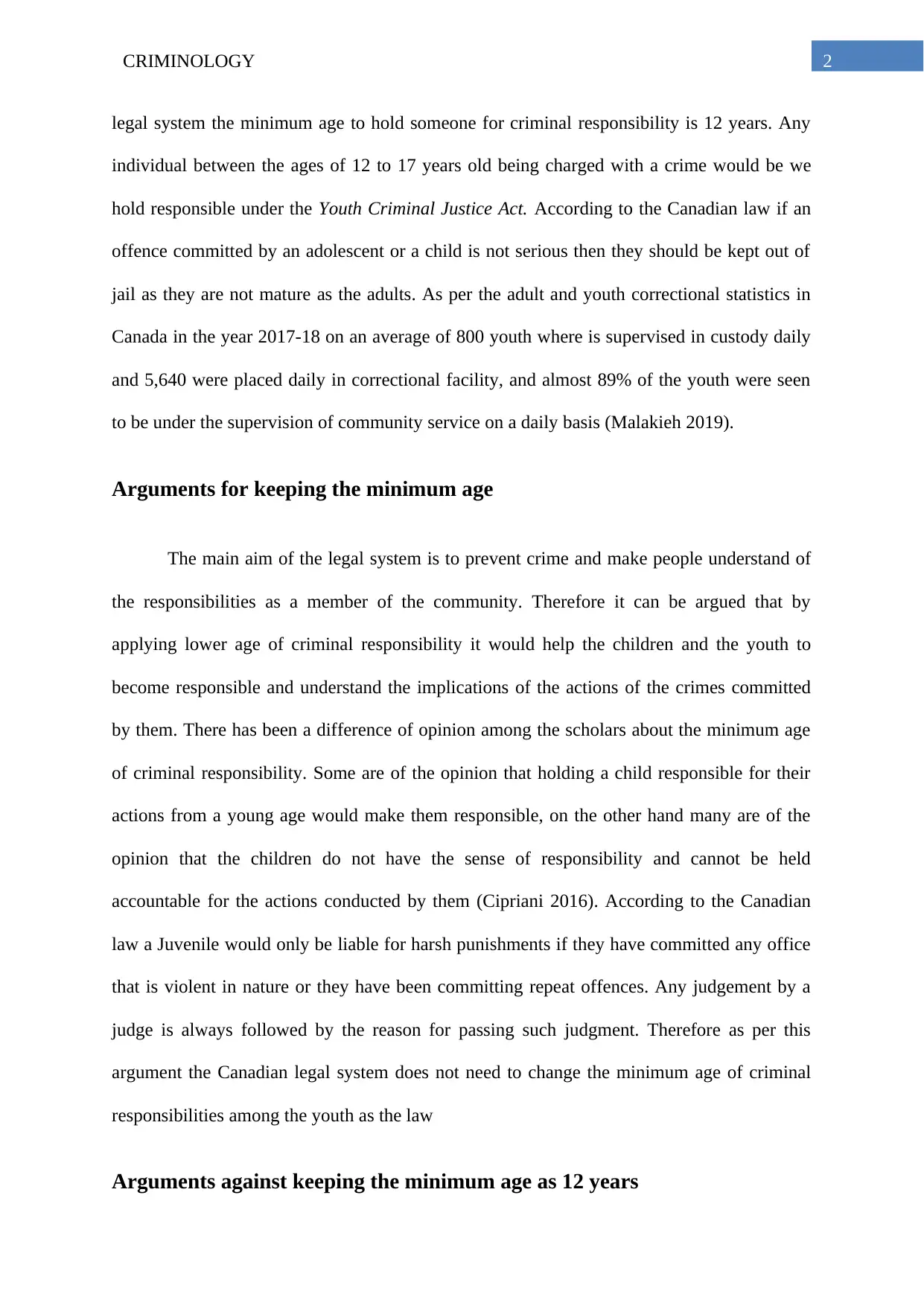
2CRIMINOLOGY
legal system the minimum age to hold someone for criminal responsibility is 12 years. Any
individual between the ages of 12 to 17 years old being charged with a crime would be we
hold responsible under the Youth Criminal Justice Act. According to the Canadian law if an
offence committed by an adolescent or a child is not serious then they should be kept out of
jail as they are not mature as the adults. As per the adult and youth correctional statistics in
Canada in the year 2017-18 on an average of 800 youth where is supervised in custody daily
and 5,640 were placed daily in correctional facility, and almost 89% of the youth were seen
to be under the supervision of community service on a daily basis (Malakieh 2019).
Arguments for keeping the minimum age
The main aim of the legal system is to prevent crime and make people understand of
the responsibilities as a member of the community. Therefore it can be argued that by
applying lower age of criminal responsibility it would help the children and the youth to
become responsible and understand the implications of the actions of the crimes committed
by them. There has been a difference of opinion among the scholars about the minimum age
of criminal responsibility. Some are of the opinion that holding a child responsible for their
actions from a young age would make them responsible, on the other hand many are of the
opinion that the children do not have the sense of responsibility and cannot be held
accountable for the actions conducted by them (Cipriani 2016). According to the Canadian
law a Juvenile would only be liable for harsh punishments if they have committed any office
that is violent in nature or they have been committing repeat offences. Any judgement by a
judge is always followed by the reason for passing such judgment. Therefore as per this
argument the Canadian legal system does not need to change the minimum age of criminal
responsibilities among the youth as the law
Arguments against keeping the minimum age as 12 years
legal system the minimum age to hold someone for criminal responsibility is 12 years. Any
individual between the ages of 12 to 17 years old being charged with a crime would be we
hold responsible under the Youth Criminal Justice Act. According to the Canadian law if an
offence committed by an adolescent or a child is not serious then they should be kept out of
jail as they are not mature as the adults. As per the adult and youth correctional statistics in
Canada in the year 2017-18 on an average of 800 youth where is supervised in custody daily
and 5,640 were placed daily in correctional facility, and almost 89% of the youth were seen
to be under the supervision of community service on a daily basis (Malakieh 2019).
Arguments for keeping the minimum age
The main aim of the legal system is to prevent crime and make people understand of
the responsibilities as a member of the community. Therefore it can be argued that by
applying lower age of criminal responsibility it would help the children and the youth to
become responsible and understand the implications of the actions of the crimes committed
by them. There has been a difference of opinion among the scholars about the minimum age
of criminal responsibility. Some are of the opinion that holding a child responsible for their
actions from a young age would make them responsible, on the other hand many are of the
opinion that the children do not have the sense of responsibility and cannot be held
accountable for the actions conducted by them (Cipriani 2016). According to the Canadian
law a Juvenile would only be liable for harsh punishments if they have committed any office
that is violent in nature or they have been committing repeat offences. Any judgement by a
judge is always followed by the reason for passing such judgment. Therefore as per this
argument the Canadian legal system does not need to change the minimum age of criminal
responsibilities among the youth as the law
Arguments against keeping the minimum age as 12 years
⊘ This is a preview!⊘
Do you want full access?
Subscribe today to unlock all pages.

Trusted by 1+ million students worldwide
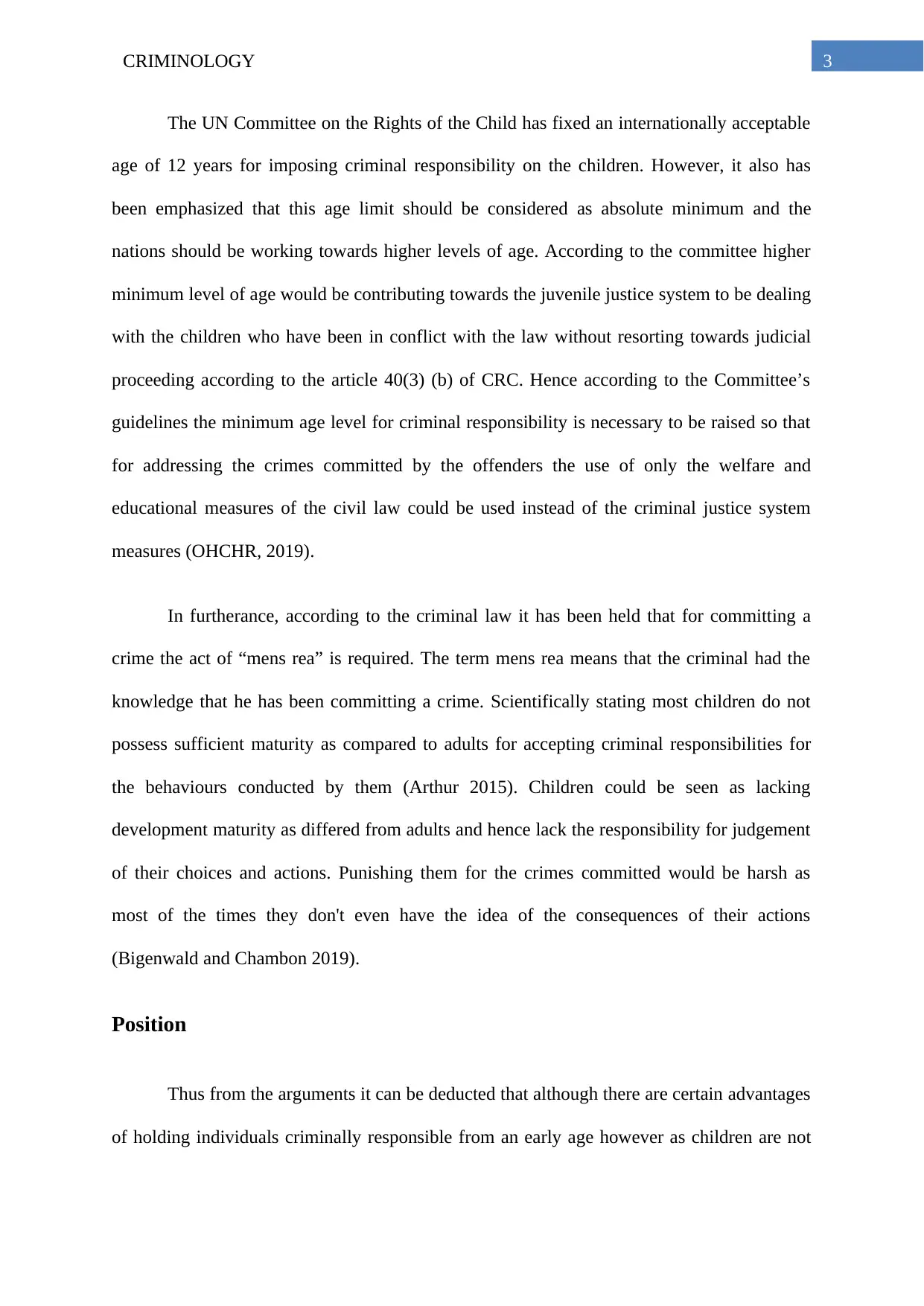
3CRIMINOLOGY
The UN Committee on the Rights of the Child has fixed an internationally acceptable
age of 12 years for imposing criminal responsibility on the children. However, it also has
been emphasized that this age limit should be considered as absolute minimum and the
nations should be working towards higher levels of age. According to the committee higher
minimum level of age would be contributing towards the juvenile justice system to be dealing
with the children who have been in conflict with the law without resorting towards judicial
proceeding according to the article 40(3) (b) of CRC. Hence according to the Committee’s
guidelines the minimum age level for criminal responsibility is necessary to be raised so that
for addressing the crimes committed by the offenders the use of only the welfare and
educational measures of the civil law could be used instead of the criminal justice system
measures (OHCHR, 2019).
In furtherance, according to the criminal law it has been held that for committing a
crime the act of “mens rea” is required. The term mens rea means that the criminal had the
knowledge that he has been committing a crime. Scientifically stating most children do not
possess sufficient maturity as compared to adults for accepting criminal responsibilities for
the behaviours conducted by them (Arthur 2015). Children could be seen as lacking
development maturity as differed from adults and hence lack the responsibility for judgement
of their choices and actions. Punishing them for the crimes committed would be harsh as
most of the times they don't even have the idea of the consequences of their actions
(Bigenwald and Chambon 2019).
Position
Thus from the arguments it can be deducted that although there are certain advantages
of holding individuals criminally responsible from an early age however as children are not
The UN Committee on the Rights of the Child has fixed an internationally acceptable
age of 12 years for imposing criminal responsibility on the children. However, it also has
been emphasized that this age limit should be considered as absolute minimum and the
nations should be working towards higher levels of age. According to the committee higher
minimum level of age would be contributing towards the juvenile justice system to be dealing
with the children who have been in conflict with the law without resorting towards judicial
proceeding according to the article 40(3) (b) of CRC. Hence according to the Committee’s
guidelines the minimum age level for criminal responsibility is necessary to be raised so that
for addressing the crimes committed by the offenders the use of only the welfare and
educational measures of the civil law could be used instead of the criminal justice system
measures (OHCHR, 2019).
In furtherance, according to the criminal law it has been held that for committing a
crime the act of “mens rea” is required. The term mens rea means that the criminal had the
knowledge that he has been committing a crime. Scientifically stating most children do not
possess sufficient maturity as compared to adults for accepting criminal responsibilities for
the behaviours conducted by them (Arthur 2015). Children could be seen as lacking
development maturity as differed from adults and hence lack the responsibility for judgement
of their choices and actions. Punishing them for the crimes committed would be harsh as
most of the times they don't even have the idea of the consequences of their actions
(Bigenwald and Chambon 2019).
Position
Thus from the arguments it can be deducted that although there are certain advantages
of holding individuals criminally responsible from an early age however as children are not
Paraphrase This Document
Need a fresh take? Get an instant paraphrase of this document with our AI Paraphraser
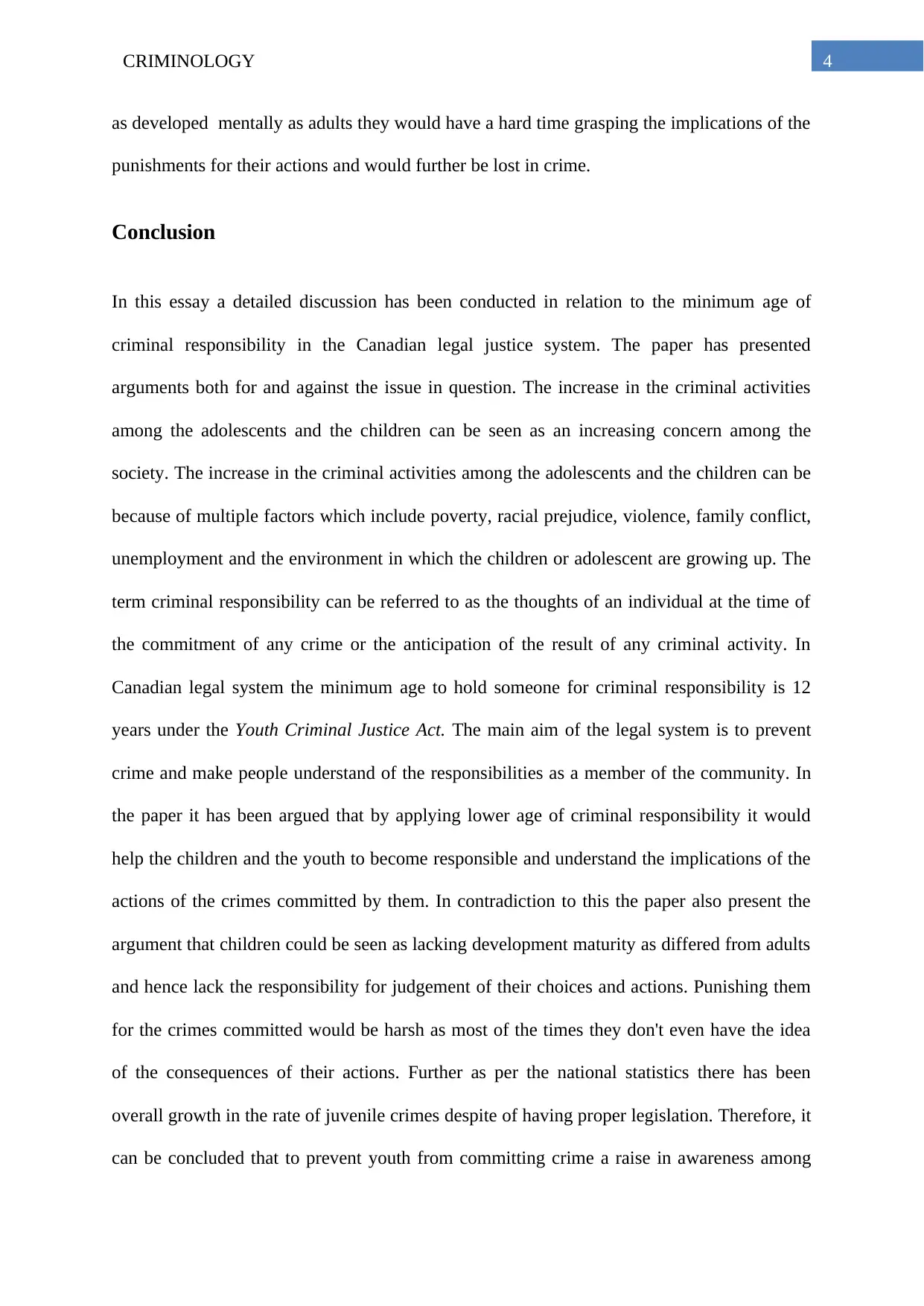
4CRIMINOLOGY
as developed mentally as adults they would have a hard time grasping the implications of the
punishments for their actions and would further be lost in crime.
Conclusion
In this essay a detailed discussion has been conducted in relation to the minimum age of
criminal responsibility in the Canadian legal justice system. The paper has presented
arguments both for and against the issue in question. The increase in the criminal activities
among the adolescents and the children can be seen as an increasing concern among the
society. The increase in the criminal activities among the adolescents and the children can be
because of multiple factors which include poverty, racial prejudice, violence, family conflict,
unemployment and the environment in which the children or adolescent are growing up. The
term criminal responsibility can be referred to as the thoughts of an individual at the time of
the commitment of any crime or the anticipation of the result of any criminal activity. In
Canadian legal system the minimum age to hold someone for criminal responsibility is 12
years under the Youth Criminal Justice Act. The main aim of the legal system is to prevent
crime and make people understand of the responsibilities as a member of the community. In
the paper it has been argued that by applying lower age of criminal responsibility it would
help the children and the youth to become responsible and understand the implications of the
actions of the crimes committed by them. In contradiction to this the paper also present the
argument that children could be seen as lacking development maturity as differed from adults
and hence lack the responsibility for judgement of their choices and actions. Punishing them
for the crimes committed would be harsh as most of the times they don't even have the idea
of the consequences of their actions. Further as per the national statistics there has been
overall growth in the rate of juvenile crimes despite of having proper legislation. Therefore, it
can be concluded that to prevent youth from committing crime a raise in awareness among
as developed mentally as adults they would have a hard time grasping the implications of the
punishments for their actions and would further be lost in crime.
Conclusion
In this essay a detailed discussion has been conducted in relation to the minimum age of
criminal responsibility in the Canadian legal justice system. The paper has presented
arguments both for and against the issue in question. The increase in the criminal activities
among the adolescents and the children can be seen as an increasing concern among the
society. The increase in the criminal activities among the adolescents and the children can be
because of multiple factors which include poverty, racial prejudice, violence, family conflict,
unemployment and the environment in which the children or adolescent are growing up. The
term criminal responsibility can be referred to as the thoughts of an individual at the time of
the commitment of any crime or the anticipation of the result of any criminal activity. In
Canadian legal system the minimum age to hold someone for criminal responsibility is 12
years under the Youth Criminal Justice Act. The main aim of the legal system is to prevent
crime and make people understand of the responsibilities as a member of the community. In
the paper it has been argued that by applying lower age of criminal responsibility it would
help the children and the youth to become responsible and understand the implications of the
actions of the crimes committed by them. In contradiction to this the paper also present the
argument that children could be seen as lacking development maturity as differed from adults
and hence lack the responsibility for judgement of their choices and actions. Punishing them
for the crimes committed would be harsh as most of the times they don't even have the idea
of the consequences of their actions. Further as per the national statistics there has been
overall growth in the rate of juvenile crimes despite of having proper legislation. Therefore, it
can be concluded that to prevent youth from committing crime a raise in awareness among

5CRIMINOLOGY
them more necessary than proper law and hence the minimum age of criminal responsibility
is also required to be raised to a certain age in which the youths are mentally capable of
understanding the consequences of their actions.
them more necessary than proper law and hence the minimum age of criminal responsibility
is also required to be raised to a certain age in which the youths are mentally capable of
understanding the consequences of their actions.
⊘ This is a preview!⊘
Do you want full access?
Subscribe today to unlock all pages.

Trusted by 1+ million students worldwide
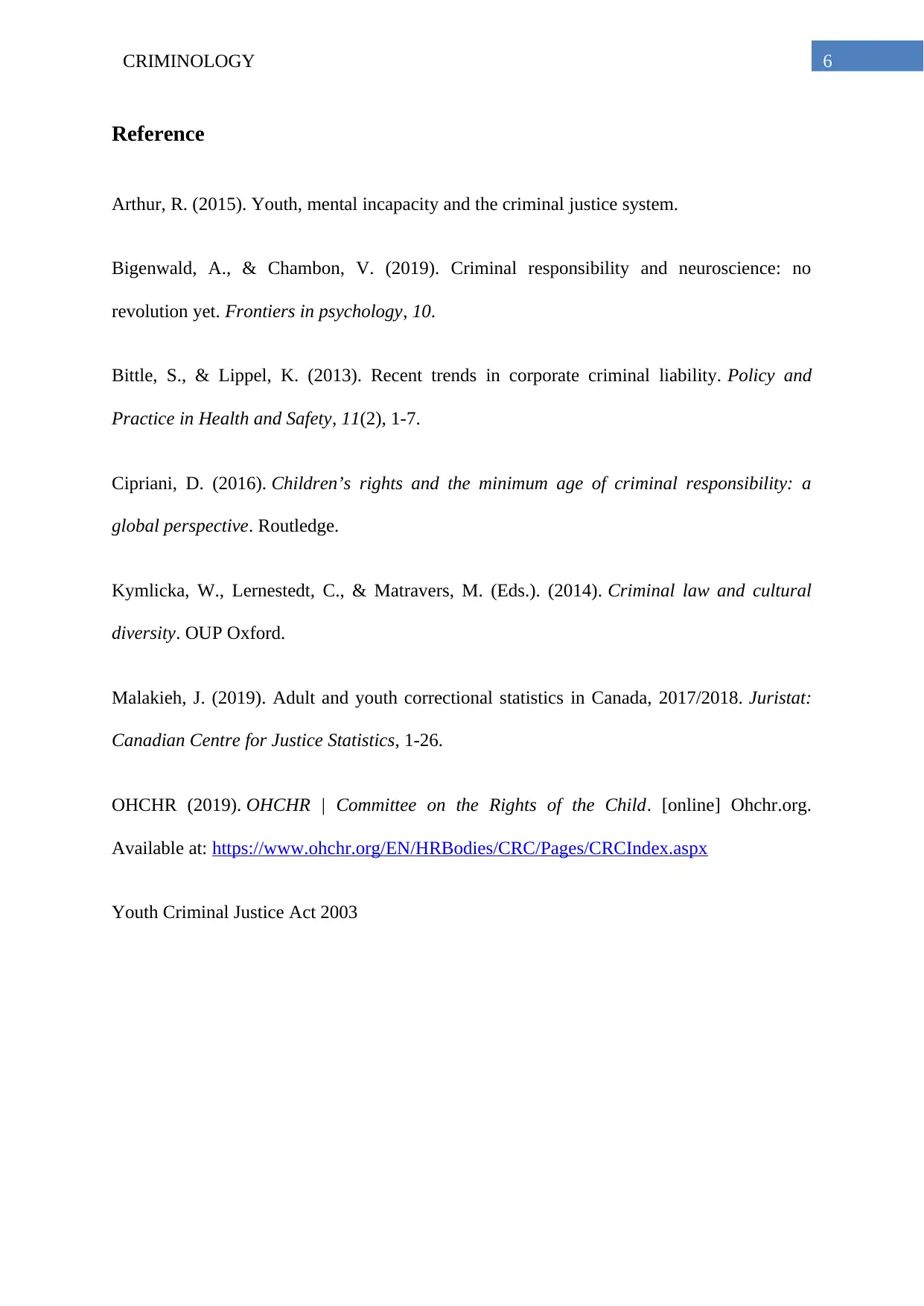
6CRIMINOLOGY
Reference
Arthur, R. (2015). Youth, mental incapacity and the criminal justice system.
Bigenwald, A., & Chambon, V. (2019). Criminal responsibility and neuroscience: no
revolution yet. Frontiers in psychology, 10.
Bittle, S., & Lippel, K. (2013). Recent trends in corporate criminal liability. Policy and
Practice in Health and Safety, 11(2), 1-7.
Cipriani, D. (2016). Children’s rights and the minimum age of criminal responsibility: a
global perspective. Routledge.
Kymlicka, W., Lernestedt, C., & Matravers, M. (Eds.). (2014). Criminal law and cultural
diversity. OUP Oxford.
Malakieh, J. (2019). Adult and youth correctional statistics in Canada, 2017/2018. Juristat:
Canadian Centre for Justice Statistics, 1-26.
OHCHR (2019). OHCHR | Committee on the Rights of the Child. [online] Ohchr.org.
Available at: https://www.ohchr.org/EN/HRBodies/CRC/Pages/CRCIndex.aspx
Youth Criminal Justice Act 2003
Reference
Arthur, R. (2015). Youth, mental incapacity and the criminal justice system.
Bigenwald, A., & Chambon, V. (2019). Criminal responsibility and neuroscience: no
revolution yet. Frontiers in psychology, 10.
Bittle, S., & Lippel, K. (2013). Recent trends in corporate criminal liability. Policy and
Practice in Health and Safety, 11(2), 1-7.
Cipriani, D. (2016). Children’s rights and the minimum age of criminal responsibility: a
global perspective. Routledge.
Kymlicka, W., Lernestedt, C., & Matravers, M. (Eds.). (2014). Criminal law and cultural
diversity. OUP Oxford.
Malakieh, J. (2019). Adult and youth correctional statistics in Canada, 2017/2018. Juristat:
Canadian Centre for Justice Statistics, 1-26.
OHCHR (2019). OHCHR | Committee on the Rights of the Child. [online] Ohchr.org.
Available at: https://www.ohchr.org/EN/HRBodies/CRC/Pages/CRCIndex.aspx
Youth Criminal Justice Act 2003
1 out of 7
Related Documents
Your All-in-One AI-Powered Toolkit for Academic Success.
+13062052269
info@desklib.com
Available 24*7 on WhatsApp / Email
![[object Object]](/_next/static/media/star-bottom.7253800d.svg)
Unlock your academic potential
Copyright © 2020–2025 A2Z Services. All Rights Reserved. Developed and managed by ZUCOL.





